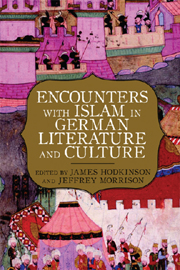Book contents
- Frontmatter
- Contents
- Acknowledgments
- Introduction
- 1 “cristen, ketzer, heiden, jüden”: Questions of Identity in the Middle Ages
- 2 Wolfram von Eschenbach, Islam, and the Crusades
- 3 Perverted Spaces: Boundary Negotiations in Early-Modern Turcica
- 4 Enlightenment Encounters the Islamic and Arabic Worlds: The German “Missing Link” in Said's Orientalist Narrative (Meiners and Herder)
- 5 Goethe, Islam, and the Orient: The Impetus for and Mode of Cultural Encounter in the West-östlicher Divan
- 6 Moving beyond the Binary? Christian-Islamic Encounters and Gender in the Thought and Literature of German Romanticism
- 7 Forms of Encounter with Islam around 1800: The Cases of Johann Hermann von Riedesel and Johann Ludwig Burckhardt
- 8 Displacing Orientalism: Ottoman Jihad, German Imperialism, and the Armenian Genocide
- 9 German-Islamic Literary Interperceptions in Works by Emily Ruete and Emine Sevgi Özdamar
- 10 Dialogues with Islam in the Writings of (Turkish-)German Intellectuals: A Historical Turn?
- 11 Michaela Mihriban Özelsel's Pilgrimage to Mecca: A Journey to Her Inner Self
- 12 Intimacies both Sacred and Profane: Islam in the Work of Emine Sevgi Özdamar, Zafer Şnocak, and Feridun Zaimoğlu
- 13 Encountering Islam at Its Roots: Ilija Trojanow's Zu den heiligen Quellen des Islam
- 14 The Lure of the Loser: On Hans Magnus Enzensberger's Schreckens Männer and Ian Buruma's Murder in Amsterdam
- Notes on the Contributors
- Index
10 - Dialogues with Islam in the Writings of (Turkish-)German Intellectuals: A Historical Turn?
Published online by Cambridge University Press: 05 February 2013
- Frontmatter
- Contents
- Acknowledgments
- Introduction
- 1 “cristen, ketzer, heiden, jüden”: Questions of Identity in the Middle Ages
- 2 Wolfram von Eschenbach, Islam, and the Crusades
- 3 Perverted Spaces: Boundary Negotiations in Early-Modern Turcica
- 4 Enlightenment Encounters the Islamic and Arabic Worlds: The German “Missing Link” in Said's Orientalist Narrative (Meiners and Herder)
- 5 Goethe, Islam, and the Orient: The Impetus for and Mode of Cultural Encounter in the West-östlicher Divan
- 6 Moving beyond the Binary? Christian-Islamic Encounters and Gender in the Thought and Literature of German Romanticism
- 7 Forms of Encounter with Islam around 1800: The Cases of Johann Hermann von Riedesel and Johann Ludwig Burckhardt
- 8 Displacing Orientalism: Ottoman Jihad, German Imperialism, and the Armenian Genocide
- 9 German-Islamic Literary Interperceptions in Works by Emily Ruete and Emine Sevgi Özdamar
- 10 Dialogues with Islam in the Writings of (Turkish-)German Intellectuals: A Historical Turn?
- 11 Michaela Mihriban Özelsel's Pilgrimage to Mecca: A Journey to Her Inner Self
- 12 Intimacies both Sacred and Profane: Islam in the Work of Emine Sevgi Özdamar, Zafer Şnocak, and Feridun Zaimoğlu
- 13 Encountering Islam at Its Roots: Ilija Trojanow's Zu den heiligen Quellen des Islam
- 14 The Lure of the Loser: On Hans Magnus Enzensberger's Schreckens Männer and Ian Buruma's Murder in Amsterdam
- Notes on the Contributors
- Index
Summary
WITH THE TERRORIST BOMBINGS of Istanbul 2003, Madrid 2004, and London 2005, Islamist terrorism finally reached European cities in the aftermath of the US bombings of 11 September 2001. In 2006 bombings were averted in Germany, but it was clear that Germany was not safe from Al-Qaida aggression. Discussions of a “tödliche Toleranz” toward Muslims in Germany followed. Federal anti-terror measures even reached the universities. In early 2007 the Bavarian Office for the Protection of the Constitution (Verfassungsschutz) published a demand addressed to the academic staff of Bavarian universities for more intense surveillance of unconstitutional Islamist activities in and outside Bavaria. The demand asked staff to report any instances of remarks indicating radical Islamic tendencies, Islamist activities, or indeed anything hinting at sudden changes in lifestyle on the part of either students or teaching staff. With Muslims accounting for 4% of Germany's population, the German educational system is faced with a growing number of German and migrant-German students with a Muslim background. And yet Islam still is a subject dealt with only by the media and, sadly, has almost no place on the academic curriculum. This seems particularly strange when many intellectuals of the second immigrant generation, who have grown up and been educated in Germany, come from a cultural background combining the Koran and Goethe's West-östlicher Divan. This is true for authors such as the Turkish-German Zafer Şenocak (born 1961) or the Persian-German Navid Kermani (born 1967), who both grew up in Muslim families, went to German schools, and graduated from German universities.
- Type
- Chapter
- Information
- Encounters with Islam in German Literature and Culture , pp. 181 - 203Publisher: Boydell & BrewerPrint publication year: 2009

